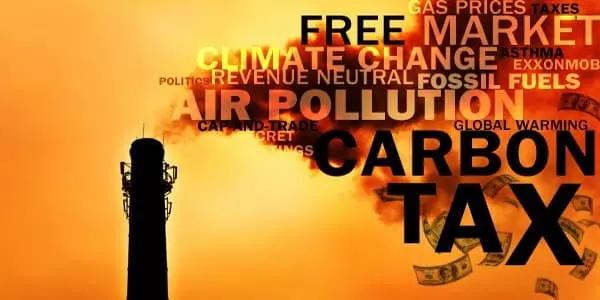Greenhouse gas emissions can be reduced by generating electricity on-site using renewables and other environmentally friendly energy sources. Rooftop solar panels, solar water heating, small-scale wind generation, natural gas or renewable hydrogen fuel cells, and geothermal energy are some examples.
According to a new study, using carbon tax revenue to fund free green electricity and public transportation could significantly reduce individual household greenhouse gas emissions. Giving these services away for free could reduce home energy emissions by 13.4% and motor fuel emissions by 23.8 %. According to the paper, which was published by the University of Leeds, offering these services for free could reduce home energy emissions by 13.4 percent and motor fuel emissions by 23.8 percent.
Carbon taxes on home energy and motor fuel frequently impose a higher burden on low-income households because the same tax rate is applied to all taxpayers, regardless of income. They do, however, contribute far less to climate change than high-income households.
Stringent climate policies, including carbon taxes on home energy and motor fuels, are likely to be part of government strategies to meet climate targets, but they impose greater burdens on low-income households than on rich households.
Dr. Milena Buchs
The researchers compared two approaches to using carbon tax revenue to reduce emissions and fuel and transportation poverty. They discovered that providing free green services would be more effective than redistributing tax revenue among the population in order to address the regressive effects of taxes on lower-income people.
Dr. Milena Buchs, Associate Professor in Sustainability, Economics, and Low Carbon Transitions at Leeds’ Sustainability Research Institute, led the study. “Stringent climate policies, including carbon taxes on home energy and motor fuels, are likely to be part of government strategies to meet climate targets,” she said, “but they impose greater burdens on low-income households than on rich households.” Governments must act quickly to make climate policies more equitable by finding ways to compensate the most vulnerable people.
“Making green living options available to people, such as free green electricity and free public transportation, is promising because it is re-distributive, reduces emissions, and reduces fuel and transportation poverty.”
The research team examined data from the European Household Budget Surveys on household expenditures on home energy and motor fuel from 275,614 households in 27 European countries (HBS). Annual greenhouse gas emissions per household for home energy and motor fuels were estimated using expenditure data combined with emission factors.

They then investigated the impact of two different compensation strategies on the impact of new carbon taxes on low-income households. They discovered that giving cash back in the form of tax breaks would result in only minor reductions in home energy and motor fuel emissions if no additional low-carbon investments such as renewable energy or public transportation were made.
It is also possible to select environmentally friendly infrastructure and equipment. Companies can set up a fleet of hybrid or even electric vehicles in this manner to renovate their employees’ cars in accordance with the most recent environmental standards. When it comes time to buy new printers, air conditioners, laptops, screens, bulbs, or office supplies, if the old ones can’t be repaired or more are required, choose the most efficient (in terms of energy) and sustainable (in terms of origin or labor ethic standards) ones.
In contrast, implementing universal green vouchers with increased renewable electricity generation and public transportation would reduce home energy emissions by 13.4% and motor fuel emissions by 23.8%. Green vouchers and infrastructure without carbon taxes would result in slightly lower emissions savings, but 4.1 percent and 2.2 percent of households would be lifted out of fuel and transportation poverty, respectively. Combining carbon taxes with cash compensation, on the other hand, would increase fuel and transportation poverty by 4.1 and 1.8 percent, respectively.
Companies, as economic agents, also play a role in raising awareness among their employees, consumers, the media, and other stakeholders. It’s a great idea to organize internal contests, hackathons, or campaigns to raise and improve awareness of sustainability issues. Collaborate with other organizations, create something original, one-of-a-kind, and powerful, and keep it at the forefront of your mind.
Dr. Buchs stated: “These findings show that policies aimed at compensating for the unequal distributional effects of carbon taxes must be combined with additional environmental interventions. Green goods and services must be expanded, and fuel and transportation poverty must be reduced, in order to meet both social and environmental goals.”
















